- Home
- Mark Wayne McGinnis
Ricket (Star Watch Book 2) Page 15
Ricket (Star Watch Book 2) Read online
Page 15
Ricket, who’d closed his eyes to better concentrate on developing close to three trillion new lines of code, opened them to find Norwell’s face staring back at him. Ten paces behind him were three Caldurian guards, also taking new notice of him. That was not good. If they were preparing to contact Hobel, it would place his escape plan in jeopardy.
Ricket, who only days earlier found lying so distasteful an act that he simply never engaged in it, was now getting used to falsifying. “I knew what was needed of me, by both you and Hobel, was way beyond my capability. I’m sorry, but I needed to increase my mental capacity. I hope you are not disappointed in me.”
The Caldurian scientist’s face relaxed some. “I don’t even know what to say to that. You look terrible.” He reached out a hand and placed the back of his palm against Ricket’s cheek. “You’re running an extremely high temperature.” Norwell spun around to face the three guards: “One of you, fetch him some water. Go! Hurry!”
Ricket closed his eyes again and concentrated on his programming. He realized he wouldn’t be able to accomplish what he’d originally intended. The concept of doing such multitasking would push him to the limit—he would be walking around in a mental fog; all connection with the outside world would eventually disappear. No, what he needed was an interface. He needed an AI to manage the Minian’s AI. An AI who would proactively handle processes for him and work in the background. The negative aspect of doing such a thing was a possible concern, as he would, in a sense, be sharing his mind with a device, which would be disconcerting, to be sure. But then again, it could be … what’s the word? Nice? Comforting? He next remembered he had a usable nested object, its compacted code already stored in his memory, taken from The Lilly’s AI years earlier. It was much smaller than what either the Minian’s, or the Parcical’s, AI provided. As much as an AI interface could have a personality, he liked The Lilly’s better. He retrieved what data was necessary and mentally wrote the appropriate sub-routines, which would allow the two AIs to communicate with each other.
Norwell was shaking his shoulder. “Ricket!”
Ricket continued with the job at hand. He only needed another few moments to finish.
Something was being placed up to his lips. Water. Ricket drank … and drank … and drank. He hadn’t realized how thirsty he had become. The quenching, hydrating sensation was overwhelming and wonderful.
“Please allocate desired nomenclature, if one is desired.”
Ricket opened his eyes. The process was complete and he’d heard the familiar, somewhat feminine, AI voice speaking within his head. Norwell was looking at him, concern on his face.
Ricket had always liked the name Beatrice, but he didn’t know why. Have I ever known a Beatrice? He didn’t think so.
He said, “Beatrice.”
“Beatrice nomenclature allocated. In the future, non-verbal response is sufficient,” Beatrice replied inside his head.
Norwell looked worried. “Ricket, I am Norwell … not Beatrice.” He turned to look at the guards. “He’s hallucinating … he doesn’t know who I am. Contact the Omni—”
Ricket stopped him. “No no … I’m fine, Norwell. Honestly, I’m feeling much better now. Thank you for the water. It helped.” Ricket slowly got to his feet. Smiling, he signaled to the guards with a raised palm that he was fine.
The tall mecher came into view. Ricket had forgotten about Trommy5, who was positioning itself between him and the guards. That was good, but hopefully unnecessary.
“Our time is up here,” Norwell said. “This has been a totally wasted session and Hobel will be most annoyed. You will have to explain to him what you’ve done to yourself and perhaps he will keep any disciplining to a minimum. Come Ricket, time to return to the Parcical.”
“I’m back,” came Bristol’s voice from the corridor. He emerged into the compartment, sweaty and out of breath. “Get out of the way!” he yelled at the two guards blocking his path. Bristol barreled through and approached Ricket. “You’re feeling better?”
“Somewhat, yes … thank you, Bristol. Did you get what you needed?”
“Yes, I did … and something else too. You’ll need this. It will make you feel better.” Bristol took one of Ricket’s hands in his own and placed a small device into it.
Then Ricket noticed the small SuitPac device that hung from Bristol’s belt. The same type of device he’d placed in Ricket’s palm. Bristol turned and looked at Trommy5.
“Hey … can you catch?”
What followed happened quickly. Ricket saw the astonished look on Norwell’s face—he’d undoubtedly become aware something was very wrong. Probably wondering where the guards who had accompanied Bristol up to Medical were. Suddenly Bristol threw something small and metallic into the air: a SuitPac device. “Stop them!” was all Norwell could muster, but it was already too late as the mecher caught the small device in one hand. First Bristol, then Trommy5, initialized their battle suits and immediately flashed away. Seconds later, Ricket too was gone.
* * *
Ricket hadn’t gone far. In fact, he now stood just ten feet away from where he’d stood mere seconds earlier. Looking down from the top of a nearby Zip accelerator, he watched the scene below erupt in chaos. Norwell was yelling for the guards to bring in reinforcements from all around the Minian, and to dispatch others to their aid from the Parcical.
The entrance to the Zip Farm went dark as a seven-foot-tall rhino-warrior filled the empty space. His heavy hammer gripped in one fist, even wearing a battle suit, Ricket recognized Traveler. Bristol, it appeared, had successfully recruited him from HAB 170.
The guards didn’t hesitate to fire their weapons. Traveler staggered back from the impact on his battle suit, then steadily moved forward. He used the integrated plasma weapon on his left wrist to return fire, while using his heavy hammer to club a Caldurian soldier over the head, then another on the back of his shoulders, when he tried to run away. The other guards ran, taking shelter behind the farthest row of accelerators.
Using his NanoCom, Ricket let Traveler know where he was standing, on top of the Zip accelerator off to Traveler’s right. Their eyes met and Traveler snorted.
“Did you bring others?” Ricket asked him.
“Everyone wanted to come. Two hundred are here, and I can get more, if needed. What do you want us to do, Ricket?”
“There are Caldurian soldiers throughout the ship and more will be entering through the mess. We need to subdue them; hopefully, without killing any others. Perhaps place our prisoners into Hold 1?”
Again, Traveler snorted. He turned and spoke to another rhino, standing behind him, who then rushed off. Suddenly, fifteen rhinos rushed into the Zip Farm—five moved left, five moved right, and the last five rushed forward. They were clearing the compartment. Although they were out of sight, he heard more plasma fire, then the distinctive sound of heavy hammers pounding down on Caldurian battle suits. So much for not killing anyone.
Norwell dashed forward, trying to skirt around the large rhino-warrior leader, but instead Traveler caught hold of Norwell’s neck and held him fast.
Ricket phase-shifted down to the deck, directly in front of the two. “Thank you for coming, Traveler.”
“Tell me, Ricket, what has happened here on the Minian? Who are these people that look like Granger?”
Ricket explained everything as quickly and efficiently as possible. He related how the Minian sat within a virtual vault of a Caldurian ship, called the Parcical, and how, presently, they were all highly miniaturized. He also explained that Hanna and Leon and probably Granger were within the same vault—unconscious … somewhere. He further explained the underlying problem with the Zip accelerators technology—that Caldurians were unable to cross over into the multiverse. Then, Ricket spoke of the probable, imminent issues that they might be facing over time, with their own nano-devices. Norwell continued trying to free himself from Traveler’s grasp, but eventually gave up.
Ricket was well aware the Ca
ldurians would not back down easily, but their own survival depended on them maintaining control of the Minian. With twelve Master Class vessels standing nearby, a force of thousands could be preparing to storm the Minian anytime.
Ricket noticed Bristol and Trommy5 approaching.
Ricket spoke fast. “We need to ensure that the mess is no longer accessible. Disable the virtual pedestal.”
“I already did that,” Bristol said. “And just so you know, disabling something that’s even partially virtual is not so easy.”
Ricket had to think about that for a fraction of a second. Bristol was right; he must have disrupted the phase-signal derived from the Parcical.
“I had to disrupt the phase-signal coming from the Parcical. That meant a phase-shift up to your workshop to jury-rig a portable, localized, disruptor-signal generator. It’s a temporary fix, though.” Bristol smiled, looking proud of himself.
“That was a good idea, Bristol. But the Minian’s AI could have accomplished the same thing and also ensured that every part of the ship maintained the same disruption throughout. So I’ll have Beatrice interface with the Minian and complete that task immediately.”
Both Bristol and Traveler stared at Ricket, blank faced.
“Who is Beatrice?” Bristol asked, confused.
Traveler leaned over, closer to Ricket. “What is wrong with your head?”
Ricket answered them both with one statement: “I’ve slightly increased the size of my cranium to make room for additional processing … there’s an AI in there I’ve named Beatrice.”
Neither Bristol nor Traveler had anything to say to that, continuing to stare at him.
“You will not escape,” Norwell spat—again trying to free himself from Traveler’s grip. “Our forces will cut you down the second you return to the Parcical. The ship, herself, will extinguish your lives within a microsecond of your return.”
“And that is why we cannot return to the Parcical,” Ricket said. The sounds of new plasma fire could be heard in the distance.
Norwell smiled. “It is only a matter of time. You cannot defeat us. You cannot escape from the Minian.”
“Escaping from the Minian would be easy, leaving through any one of the Zoo habitats. We’ve already proven escape is not an issue. Your MicroVault terminal is virtually the same, albeit more elaborate, as any habitat portal. But we cannot extricate the Minian from her position here, and that is unfortunate.”
Ricket began to walk around the Zip accelerator situated behind them. He looked at the deck—how the big contraption had been mounted there, with heavy, odd-shaped bolts.
Ricket returned to the group and placed a hand on the Zip accelerator. He looked up at Traveler. “You need to get more help … we’ll need to take this with us.”
Chapter 23
High Orbit Over Alurian, Gracow CD1 System
Parcical, Zip Farm
__________________________
“What are you talking about?” Bristol asked. “Do you have any idea how heavy that thing is?”
Ricket looked at the large device and said, “It’s approximately thirty-six tons … give or take a ton or two. But we must hurry now. We need to get out of the MicroVault as soon as possible.”
“What’s the rush? The Caldurians won’t be able to infiltrate this space, at least not now.”
Ricket looked at Bristol sympathetically. “You have forgotten one key factor: where we are located.”
“What? Oh no.” Bristol slapped his forehead with an open palm. “Crap … we’re in virtual space. We can be deleted.”
“That is right. The simple fact, though, is that anything that was processed via the MicroVault terminal has been logged and catalogued. As you said, any item—the Minian, we as individuals, all of us … can be deleted with the simple push of a button.”
Traveler snorted loudly and looked around the large compartment.
“Not sure what would happen to you, big guy,” Bristol said. “You can’t be deleted, since you came here in a different way. But without the Minian here, you’d probably just float around in the MicroVault for eternity.”
Three more snorts from Traveler, who looked uneasy.
“Please don’t taunt Traveler, Bristol. I have an idea. It’s really quite simple, and I have Beatrice already working on it.”
“And what is that?” Bristol asked.
“We’ll build our own MicroVault terminal, right here—within the Minian. But there is the not-so-insubstantial issue of locking into specific, relative planes of existence—planes of the multiverse. Personally, we’ll be moving items—going from a virtual plane of reality, back into a non-virtual, material plane. It’s basically all math: Beatrice has completed some of the calculations.”
“Hey, that’s a pretty good idea. How can I get another Beatrice put into my cranium?” Bristol asked. Then, looking over at Ricket’s distorted head, he made a face. “Never mind.”
Bristol said, “Back to what you said earlier, Ricket. Hobel won’t delete the ship. He knows the importance of the Zip accelerators. He would delete me … the guy never liked me.”
Ricket could not refute what the young junior science officer said. “Then I must hurry to my workshop. Traveler, please find the necessary tools to remove those mounting bolts on the Zip accelerator, and let me know when that has been accomplished.”
“And him?” Traveler asked, looking at Norwell.
“I will secure him within the brig,” Trommy5 said, with more gusto than one would expect from a robot.
* * *
Just over two hours had passed since Ricket and Bristol entered the workshop on Deck 23. They’d made several phase-shifts back to the mess compartment, where what remained of the disabled MicroVault mobile pedestal had been re-accessed and partially hacked, code to be used as a starting place for implementing their own designs.
“I have the final batch of data for you, Ricket. Are you ready for it to be uploaded?”
Ricket almost answered verbally, still not used to speaking to an internal AI. “Thank you, Beatrice. I believe Bristol is almost done with the last batch … please wait.”
Bristol continued entering information into a terminal in the corner of the room. Every so often he would look up and gaze out the workshop hatchway to evaluate his latest change or alteration. Although more basically designed than the MicroVault terminal compartment on the Parcical, Ricket, Bristol and Beatrice managed to create a remarkable facsimile in the empty compartment across the corridor. What was empty space only thirty minutes earlier now gave the appearance of a fully functioning MicroVault terminal.
Bristol slammed his fist down on the workbench. “This is really annoying the crap out of me.”
“What is wrong, Bristol?” Ricket asked, getting up from his seat and going over to his side.
“I’m not used to working with this … this … virtualware. I mean, it’s basically just fart-matter, right? Numbers—formulas that inevitably allow all known physics to be thrown out the window. Take nothingness—we give it weight and mass and the ability to physically interact with the physical environment around it. Around us! Hell, I’m used to plugging one end of a cable into connector A and the other into connector B. But here, there is no cable … there is no frigging connector!”
“Would you like me to take over for you? I am finished with my part. Beatrice has the last piece of the formula worked out.”
“No … I’m doing this part by myself. Shit, the guy gets his own internal AI and he thinks he knows it all. Just take a step back so I can finish.” Bristol, soon back immersed in his work with only an occasional swearword, seemed to be making good progress.
Ricket wandered across the corridor to the newly constructed MicroVault terminal, which was approximately twenty feet wide, by thirty feet long, by fifteen feet high. Like the original, a wrap-around display rested on a central pedestal—a small virtual display atop it. Everything could be controlled from this one location. The compartment was larger
than the one on the Parcical for good reason: There were certain items on board the Minian Ricket wanted to take with him, such as the colossal-sized Zip accelerator unit down on Deck 18. Their plan was to phase-shift it into this compartment within the next hour, where it would then be projected out, back into the real world in its full original size. It was a good plan—they were making excellent progress, but something nagged at Ricket. He hated the thought of the Minian being left behind. He assumed the Minian could not be taken from her present location, tucked within the virtual, miniaturized space within the MicroVault, because one had to be outside an object—separate or apart from it—in order to achieve such a thing. But was that actually true?
He posed the question to Beatrice, but her answer didn’t come back immediately. He was about to ask again, phrase it slightly differently, when he heard her voice:
“Your assumption that the newly constructed MicroVault terminal would need to be outside the virtual constraints of the Minian is correct.”
“Thank you, Beatrice,” Ricket said, feeling disappointed. “Well, now I know the ship must remain here.”
“That is incorrect, Ricket.”
“Why is that … have I miscalculated?”
“You must keep in mind, Ricket, the MicroVault terminal is not a physical construct. It can reside virtually anywhere, including outside the ship, or within the open storage space surrounding it.”
Ricket slapped his own forehead and instantly regretted doing so. His head began to throb again. Bristol was scowling at him from across the corridor. Ricket ran from the MicroVault terminal and back into his workshop. He stood and stared at Bristol.
“You’re creeping me out, Ricket.”
“We’ll need two of those.”
“Of what?”
“The MicroVault terminals.”
“Dude … do you know how hard it was to create even one—” he cut himself off, realizing how stupid that sounded. “Don’t say it,” Bristol said, shaking his head. “I know … it’s virtual … it’s all virtual. To duplicate it we only need to cut and paste the code.”

 The Hidden Ship
The Hidden Ship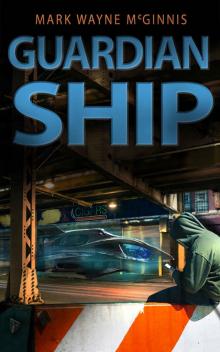 Guardian Ship
Guardian Ship Cloudwalkers
Cloudwalkers Mad Powers (Tapped In)
Mad Powers (Tapped In) Ship Wrecked
Ship Wrecked The Great Space (Scrapyard Ship Book 6)
The Great Space (Scrapyard Ship Book 6)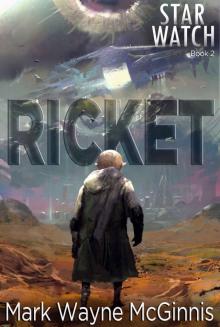 Ricket (Star Watch Book 2)
Ricket (Star Watch Book 2)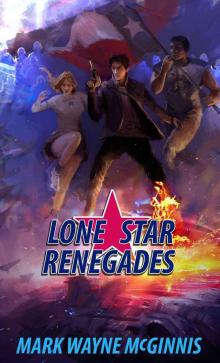 Lone Star Renegades
Lone Star Renegades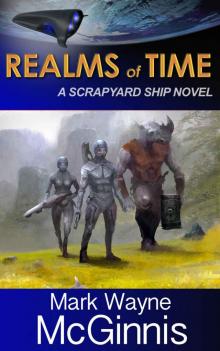 Realms of Time (Scrapyard Ship)
Realms of Time (Scrapyard Ship) Glory for Sea and Space (Star Watch Book 4)
Glory for Sea and Space (Star Watch Book 4) Scrapyard Ship 3 Space Vengeance
Scrapyard Ship 3 Space Vengeance Boy Gone
Boy Gone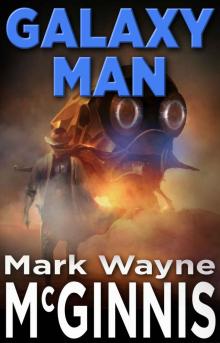 Galaxy Man
Galaxy Man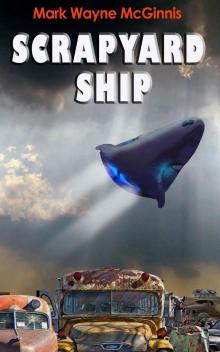 Scrapyard Ship
Scrapyard Ship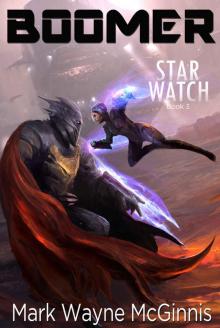 Boomer (Star Watch Book 3)
Boomer (Star Watch Book 3)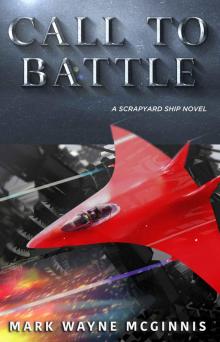 Scrapyard Ship 7: Call to Battle
Scrapyard Ship 7: Call to Battle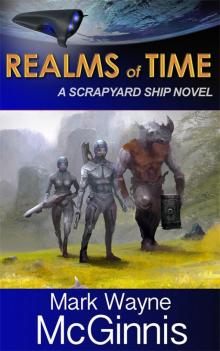 Scrapyard Ship 4 Realms of Time
Scrapyard Ship 4 Realms of Time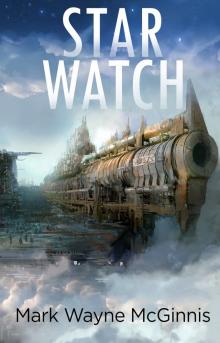 Star Watch
Star Watch The Simpleton QUEST
The Simpleton QUEST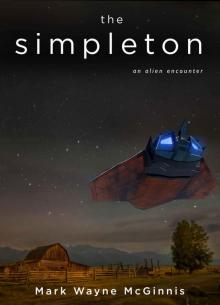 The Simpleton: An Alien Encounter
The Simpleton: An Alien Encounter Scrapyard LEGACY (Star Watch Book 6)
Scrapyard LEGACY (Star Watch Book 6) Ship Wrecked: Stranded on an alien world
Ship Wrecked: Stranded on an alien world